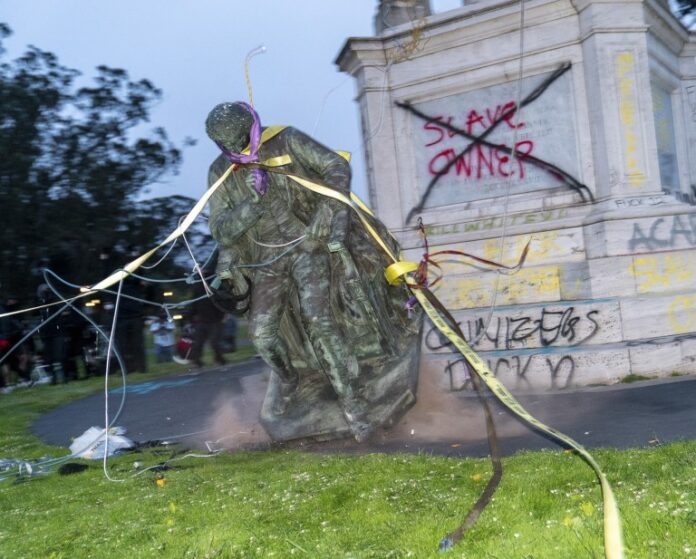
By Elizabeth Castillo
As the U.S. reckons once again with racial inequities, it’s triggered a new round of calls to remove statues and monuments idolizing Confederate leaders and those who enslaved people. While Mississippi is retiring its Confederate battle flag and Alabama and Georgia join the movement to topple bronze statues, California is not without its vestiges of racism and oppression.
“You do have a deep link between Southern California and the Confederacy,” said Ryan Keating, an associate professor of history at California State University, San Bernardino. “In the wake of the war, you have Southern veterans who relocate to Southern California en masse and when they arrive, they attempt to memorialize their service through the creation of monuments.”
Keating said these monuments frequently coincide with other historical events. For example, a number of Confederate monuments were erected in the early 1950s shortly after the Supreme Court ruling on Brown v. Board of Education which declared state-sanctioned segregation unconstitutional.
“These monuments and these memorials tend to be in very public places,” Keating said. “They coincide with moments in which African Americans seem to be gaining some political power or voice and they’re designed with a very specific intent of protecting a certain type of power and serving as a reminder of who’s in control.”
In California, a handful of highway markers and cemetery memorials remained visible but the Black Lives Matter movement quickly pushed the state to eradicate them completely. Some of the markers were erected by the United Daughters of the Confederacy, a historical group dedicated to “honoring the memory of its Confederate ancestors” and labeled neo-Confederate by the Southern Poverty Law Center. The organization still exists today.
“The United Daughters of the Confederacy totally denounces any individual or group that promotes racial divisiveness or white supremacy,” says a statement by President General Nelma Crutcher on the organization’s national homepage. “We are saddened that some people find anything connected with the Confederacy to be offensive. Our Confederate ancestors were and are Americans. We as an Organization do not sit in judgment of them nor do we impose the standards of the 19th century on Americans of the 21st century.”
Messages left with the California chapter and the national organization were not returned.
Jacob Ohara contributed to this story.


